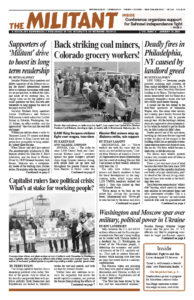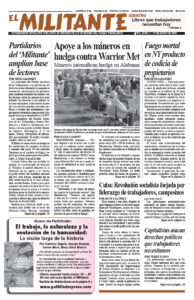February 3, 1997
All those who support women’s rights and democratic rights should be in the streets and in front of the clinics in response to the bombings of abortion facilities in Atlanta and Tulsa, Oklahoma. Protests and meetings are needed to speak out against the bombings, organize clinic defense, and demand the government find and prosecute those responsible.
As the capitalist economic system continues its downward spiral, the employing class must try to roll back, or at least slow down, some changes in consciousness about women’s place in society. The goal of the bosses and their government is to undermine workers’ political self-confidence and class consciousness in order to drive down the value of labor power, by increasing divisions in the working class.
Labor must include support for women’s rights, and the fight for a woman’s right to an abortion, in its demands.
February 4, 1972
The following statement was issued by Linda Jenness, Socialist Workers Party candidate for president, on Jan. 27:
President Nixon’s televised speech Jan. 25 did not present a “peace plan” for Southeast Asia but a formula for continued war. Nixon says his proposal is an “honorable” way for the U.S. to end the war. I say there is only one honorable step the U.S. can take — the immediate and unilateral withdrawal by the U.S. in the affairs of Vietnam, Cambodia and Laos.
Nixon has appealed to the American people for unity behind his proposal for a “settlement” rather than a “surrender.” At the same time, on the very day of his speech, the U.S. was raining bombs on North Vietnam and stepping up the air war in Laos.
President Nixon, the antiwar movement will answer you on April 22, the next date scheduled for major demonstrations against the war.
February 1, 1947
BRUSSELS — The stubborn, four-week strike waged by the dockworkers of Antwerp against great odds, has ended in the greatest strike victory in this country since the “liberation.” The strike began on Dec. 13, when 14,000 dockworkers walked off their jobs over low wages in the face of rising prices.
The government sent 2,000 troops to the docks to unload perishable goods. This was intended to intimidate the strikers as well as to check the paralyzing of the most important port on the continent. All financial support was denied to the strikers. Trade union funds were barred to them and the government refused them unemployment relief for taking part in an “unauthorized” strike.
But they did not reckon with the strikers’ extraordinary determination. Without money, food, or coal in freezing weather, the strikers and their wives held fast. Not a single dockworker answered attempts to hire strikebreakers.

